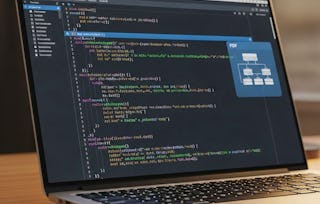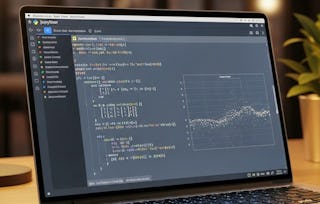By the end of this course, learners will be able to install Python correctly, configure their environment, and execute scripts confidently. They will apply variables, lists, strings, and type conversions; construct input/output programs; and implement arithmetic operations. Learners will also analyze and design loops for prime numbers, Fibonacci sequences, and pattern generation, and build modular programs with functions, parameters, and return values.

Python Basics: Learn, Apply & Build Programs

Python Basics: Learn, Apply & Build Programs
This course is part of Python Developer: From Basics to Case Studies Specialization

Instructor: EDUCBA
Access provided by N.S. International
3,076 already enrolled
34 reviews
What you'll learn
Install Python, configure environments, and run basic scripts.
Apply variables, lists, strings, loops, and arithmetic operations.
Build modular programs with functions and real-world examples.
Skills you'll gain
- Algorithms
- Data Processing
- Data Validation
- Debugging
- Software Installation
- System Configuration
- Computational Thinking
- Program Development
- Python Programming
- Development Environment
- Computer Programming
- Skills section collapsed. Showing 10 of 11 skills.
Details to know

Add to your LinkedIn profile
8 assignments
October 2025
See how employees at top companies are mastering in-demand skills

Build your subject-matter expertise
- Learn new concepts from industry experts
- Gain a foundational understanding of a subject or tool
- Develop job-relevant skills with hands-on projects
- Earn a shareable career certificate

There are 2 modules in this course
This module orients beginners to the Python ecosystem and gets them hands-on quickly. Learners install Python correctly (including PATH), verify the interpreter/IDLE, and run first scripts from the command line. Through practical, bite-sized examples they practice input/output, numeric and string conversions, and core data types. The module closes by firming up essentials—variables, lists, slicing, and basic control flow—so learners can write small, correct programs and debug simple mistakes confidently.
What's included
10 videos4 assignments
This module deepens problem-solving with Python by mastering iteration patterns and modular design. Learners explore for/while, ranges, and nested loops to generate numeric sequences and text patterns, then encapsulate logic using functions with parameters, returns, and defaults. They implement classic algorithms (prime checks, Fibonacci, HCF/GCD–LCM) and craft advanced pattern programs (centered pyramids, Pascal’s triangle, Floyd’s triangle) while practicing input validation and clean program structure.
What's included
9 videos4 assignments
Earn a career certificate
Add this credential to your LinkedIn profile, resume, or CV. Share it on social media and in your performance review.
Why people choose Coursera for their career

Felipe M.

Jennifer J.

Larry W.

Chaitanya A.
Learner reviews
- 5 stars
70.58%
- 4 stars
14.70%
- 3 stars
11.76%
- 2 stars
0%
- 1 star
2.94%
Showing 3 of 34
Reviewed on Nov 25, 2025
I’m so glad I took this course! The lessons on loops and functions were easy to
Reviewed on Nov 11, 2025
Clear explanations and good examples, though more practice would help.
Reviewed on Dec 16, 2025
The “learn, apply, and build” approach helps learners practice immediately after understanding each topic.





